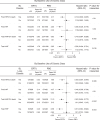Cardiovascular and Renal Outcomes with Ertugliflozin by Baseline Use of Renin-Angiotensin-Aldosterone System Inhibitors or Diuretics, Including Mineralocorticoid Receptor Antagonist: Analyses from the VERTIS CV Trial
- PMID: 40028005
- PMCID: PMC11870670
- DOI: 10.1159/000543162
Cardiovascular and Renal Outcomes with Ertugliflozin by Baseline Use of Renin-Angiotensin-Aldosterone System Inhibitors or Diuretics, Including Mineralocorticoid Receptor Antagonist: Analyses from the VERTIS CV Trial
Abstract
Introduction: VERTIS CV was a placebo-controlled cardiovascular (CV) outcome trial evaluating the sodium-glucose cotransporter 2 inhibitor ertugliflozin in patients with type 2 diabetes and established atherosclerotic CV disease. The aim of the current analyses was to evaluate VERTIS CV cardiorenal outcomes according to baseline use of renin-angiotensin-aldosterone system (RAAS) inhibitors or diuretics, including mineralocorticoid receptor antagonists (MRAs).
Methods: Participants received ertugliflozin 5 mg, ertugliflozin 15 mg, or placebo once daily and were followed for a mean of 3.5 years. Prespecified CV and kidney outcomes were analyzed by Cox proportional hazard modeling in participant subgroups defined by baseline use of RAAS inhibitors (angiotensin-converting enzyme inhibitors, angiotensin II receptor blockers) or diuretics (loop diuretics, non-loop diuretics, MRAs), with interaction testing to assess for treatment effect modification.
Results: A total of 8,246 patients were randomized in VERTIS CV. At baseline, 6,686 (81%) participants were being treated with RAAS inhibitors, 3,542 (43%) with diuretics, 1,252 (15%) with loop diuretics, and 674 (8%) with MRAs. No significant interactions were observed for cardiorenal outcomes by baseline use of RAAS inhibitors or MRAs (p interaction > 0.05 for all). Statistically significant interactions for a first event of hospitalization for heart failure (HHF) or CV death, and of HHF (alone), were observed with baseline use of diuretics, including loop diuretics, with an increased benefit of ertugliflozin treatment versus placebo.
Conclusion: In VERTIS CV, baseline use of diuretics, particularly loop diuretics, identified a subgroup that demonstrated greater benefit with ertugliflozin on first HHF/CV death and HHF outcomes, with no modification of treatment effect observed with baseline use of RAAS inhibitors or MRAs. There was no evidence of treatment effect on the kidney composite outcomes by baseline use of RAAS inhibitors, diuretics, loop diuretics, or MRAs.
Keywords: Cardiovascular disease; Ertugliflozin; SGLT2 inhibitor; Type 2 diabetes.
© 2025 The Author(s). Published by S. Karger AG, Basel.
Conflict of interest statement
D.Z.I.C. has received consulting fees and/or speaking honorarium from AstraZeneca, Bayer, Boehringer Ingelheim, Eli Lilly, Janssen, Merck & Co. Inc., Rahway, NJ, USA, Mitsubishi-Tanabe, Novo Nordisk, Prometic, and Sanofi and has received operating funds from AstraZeneca, Boehringer Ingelheim, Eli Lilly, Janssen, Merck & Co. Inc., Rahway, NJ, USA, Novo Nordisk, and Sanofi.Novo Nordisk, and Sanofi. R.E.P. has received grants (directed to his institution) from Hanmi Pharmaceutical Co., Ltd, Janssen, Metavention, Novo Nordisk, Poxel SA, and Sanofi; has received consulting fees (directed to his institution) from AstraZeneca, Corcept Therapeutics Incorporated, Glytec LLC, Hanmi Pharmaceutical Co., Ltd, Janssen, Merck & Co., Inc., Rahway, NJ, USA, Mundipharma, Novo Nordisk, Pfizer, Sanofi, Scohia Pharma Inc., and Sun Pharmaceutical Industries; and has received support for attending meetings/travel (directed to his institution or to the travel provider) from AstraZeneca, Glytec LLC, Merck & Co., Inc., Rahway, NJ, USA, Mundipharma, Novo Nordisk, and Pfizer. F.C. has received research grants from the Swedish Research Council, Swedish Heart & Lung Foundation, and King Gustav V and Queen Victoria Foundation and has received consulting fees from Abbott, AstraZeneca, Bayer, Boehringer Ingelheim, Bristol Myers Squibb, Merck Sharp & Dohme, Mundipharma, Novo Nordisk, and Pfizer. S.D.-J. has led clinical trials for AstraZeneca, Boehringer Ingelheim, and Novo Nordisk, Inc.; has received consulting fees from AstraZeneca, Bayer, Boehringer Ingelheim, Janssen, Merck & Co. Inc., Rahway, NJ, USA, and Sanofi; and has equity interests in Jana Care, Inc. and Aerami Therapeutics. A.P. and I.G. are employees of Merck Sharp & Dohme LLC, a subsidiary of Merck & Co., Inc., Rahway, NJ, USA, who own stock in Merck & Co., Inc., Rahway, NJ, USA. R.F., N.B.C., J.P.M., and U.M. are employees and shareholders of Pfizer. C.P.C. has received research grants from Amgen, Better Therapeutics, Boehringer Ingelheim, Bristol Myers Squibb, Daiichi Sankyo, Janssen, Merck, Novo Nordisk, and Pfizer, as well as fees from Aegerion/Amryt, Alnylam, Amarin, Amgen, Applied Therapeutics, Ascendia, Boehringer Ingelheim, Bristol Myers Squibb, Eli Lilly, Janssen, Lexicon, Merck, Pfizer, Rhoshan, and Sanofi; and serves on Data and Safety Monitoring Boards for the Veteran’s Administration, Applied Therapeutics, and Novo Nordisk.
Figures



References
-
- Schmieder RE, Hilgers KF, Schlaich MP, Schmidt BMW. Renin-angiotensin system and cardiovascular risk. Lancet. 2007;369(9568):1208–19. - PubMed
-
- von Lueder TG, Krum H. RAAS inhibitors and cardiovascular protection in large scale trials. Cardiovasc Drugs Ther. 2013;27(2):171–9. - PubMed
-
- Verma S, McMurray JJV. SGLT2 inhibitors and mechanisms of cardiovascular benefit: a state-of-the-art review. Diabetologia. 2018;61(10):2108–17. - PubMed
-
- Zinman B, Wanner C, Lachin JM, Fitchett D, Bluhmki E, Hantel S, et al. . Empagliflozin, cardiovascular outcomes, and mortality in type 2 diabetes. N Engl J Med. 2015;373(22):2117–28. - PubMed
LinkOut - more resources
Full Text Sources

